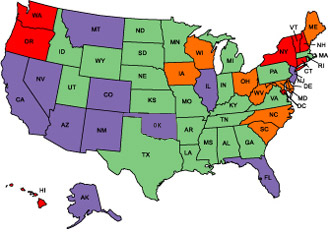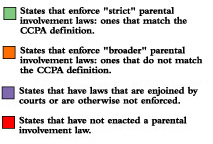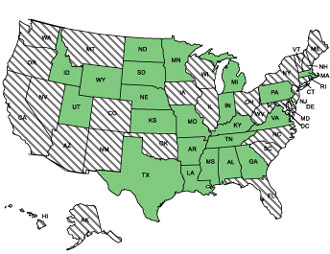| Last Updated August
2002
For more information on parental involvement laws see our section on adolescents
|
|
The Child
Custody Protection Act
Creating Chaos and Punishing
Adolescents
Latest Update:
4/17/02 - House Passes
Anti-Abortion Legislation
The Child Custody Protection Act (H.R. 476)
would make it a federal crime for any person, other than a parent, to
knowingly transport a minor across state lines for the purpose of
obtaining an abortion, if she has not first complied with the forced
parental involvement law of her state of residence. CCPA defines the term
“parental involvement law” as a law “requiring, before an abortion is
performed on the minor, (i) either the notification to, or consent of, a
parent of that minor; or (ii) proceedings in a State court” which waive
the requirement. State laws that permit notification to or consent of any
other person, such as a grandparent or aunt, do not qualify as “parental
involvement laws” under CCPA.
State Laws
Before CCPA


Note: Specific requirements in the states with mandatory parental
involvement laws vary widely. Most states require notice or consent of at
least one parent; however, some states require counseling that must
include a discussion of parental involvement.
State Laws After
CCPA


CCPA In Your
State
CCPA discriminates amongst state laws: not every
state's parental involvement law will follow a minor from her state of
residence to the state where she obtains an abortion. The bill's
requirements apply to only those "parental involvement laws" as defined by
CCPA. Therefore, under CCPA, the requirements of "strict" parental
involvement laws - those that match the CCPA definition - will be imposed
on minors traveling out-of-state with companions and abortion providers in
those states. However, CCPA will not impose the requirements of a state
law that is "broader" than the CCPA definition - such as a law that allows
a grandparent to consent to the minor's abortion - on accompanied minors
or providers in other states. Thirty-two states enforce parental
involvement laws. These laws vary in their requirements, but, absent CCPA,
they apply only to minors receiving an abortion within the state.
Twenty-three
states have "strict" laws that fit CCPA's restrictive definition of a
"parental involvement law".
Nine states
have parental involvement laws that are "broader" than the definition
in CCPA, in that they do not limit the notification or consent requirement
to a parent exclusively, but allow involvement of some other adult, such
as a grandparent or other relative, clergy member, or counselor.
Eleven
states have enacted parental involvement laws, which are not enforced
within the state due to court rulings or Attorney General opinions.
Seven states and
the District of Columbia have not enacted forced parental involvement
laws.
State-by-State
|